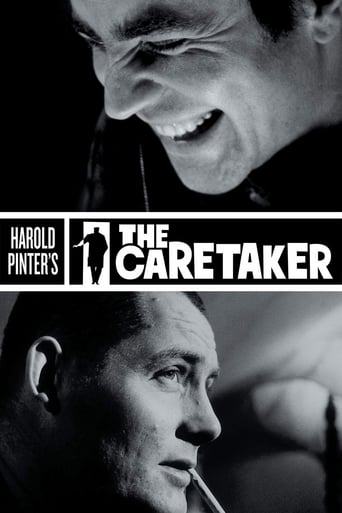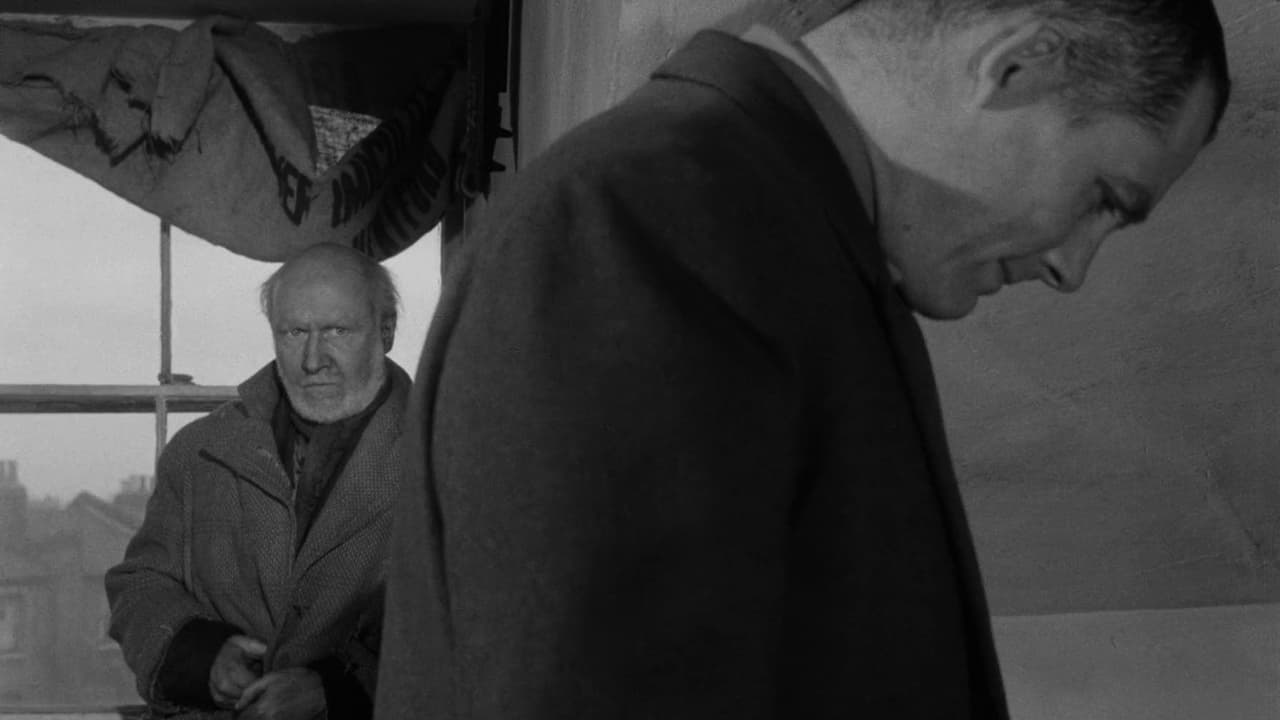kijii
This film was made from Harold Pinter's first successful stage play of the same name. The play has only three characters and no clear-cut plot. (It is part of "Theater of the Absurd," movement of the time.) Yet, it was so powerful on stage that Clive Donner, Michael Birkett, and Donald Pleasence wondered about making into a film. Once Harold Pinter approved of the project, the financing—even for such a small film--was difficult since it was assumed that mass audience appeal would be limited. In the end, its financing and co-production was dependent on other actors and playwrights of the time, such as Elizabeth Taylor, Richard Burton, and Noel Coward.As the movie opens, we see two men walking down the street on a bitter cold day. One man, Bernard Jenkins (Donald Pleasence) seems to be a vagrant. He is doing all the talking as the taller more reserved man, Aston (Robert Shaw), is taking him to his house after protecting him a downtown brawl. After the two climb the long spiral stairs to the upper story of a large rundown house, Aston invites Jenkins to come into his room and warm up. He asks what he can do for him. When Jenkins says he needs some new shoes, Aston tries to give him a pair of his shoes. But, they are too small for Jenkins. All of Jenkins' comments are met with short polite answers or affirmations from Aston. Aston's personality seems flat (almost mechanical) as he continually refers to restoring the shed in the backyard. That seems to be his goal in life since as he says, "I'm good with my hands, you see." When Aston says he has to go out, Jenkins gets up to leave, But, Aston says that he can stay in spite of him not being with him in the house. So, Aston leaves and Jenkins stays.Next, the third character enters the play-on-film: Mick (Alan Bates).When he comes into the room, Jenkins is taken back since Mike says that he is the proprietor of the building. Jenkins, who is there because of Aston, doesn't know how to respond. Mick is more acerbic than his brother, Aston. He never asks Jenkins to leave, but he is still cruel to him as he brags about his plans to restore the place. He implies that his brother is a slow worker and hasn't got much done. Jenkins then identifies with Mick in order to stay there. When Mick asks Jenkins to be the caretaker of the place and help fix it up—which Jenkins had already agreed to do with Aston--Jenkins agrees. When Aston returns, there is a very short scene with all three characters in the one room. Not much is said or implied about the relationship among these three characters. When Mick leaves, Aston tell Jenkins his personal story in simple terms. As a minor and without his consent, he was subjected to electric shock treatments in a mental hospital. The reason, he says, was based on 'lies' that were told at a local café. After hearing the story, Jenkins senses that his way into the staying in the rundown room lies with Mick- -and not Aston. But, later when Jenkins starts to put down Aston to Mick, Mick refuses to say that there is anything wrong with his brother. In fact, he attacks Jenkins for implying such a thing.The puzzle for Jenkins is to figure out which 'horse to back' between these two brothers: how best can he assure his 'caretaker' role in this rundown house. Jenkins is always the outsider trying to get in. But, he is unable to pry his way between these two brothers that need each other in some unspoken way. Each of the three characters has pipe dreams. And their pipe dreams are—in some way--dependent on one of the other two. But, since their dreams remain unspoken, the riddle is who will win and who will lose
and why.
writers_reign
A reasonably faithful adaptation of the stage play by the dramatist himself, Harold Pinter. As I write this the play has been revived yet again in London with Timothy Spall leading the cast. This proves that the play has legs even in the one-room claustrophobic setting which Pinter opened out marginally for the screen. There are still only three actors as Pinter wisely resisted showing those only mentioned on stage - the cafe proprietor who fired Davis, plus possible patrons of the cafe; the monk who brushed Davis off, etc. All three actors, Alan Bates, Robert Shaw, and Donald Pleasance are at the top of their game and play off each other brilliantly, none more so than Robert Shaw, best known for semi-violent roles to come, such as The Sting and Jaws, here playing a passive quasi zombie in the wake of a lobotomy. More Art House than Multiplex but none the worse for that.
jerbar2004
I could not belief how good this movie is having seen many years ago on the big screen, and now on a BFI DVD. The sets suit the play so well, and the cast is very believable in every thing they do. The transfer from stage to screen is first class, and the pauses, delivery of the said lines is just right for the play. My only sadness is that WE "the British Film Industry" are just not producing things of this type nowadays rather than just a sad pap of work which demands no merit. Long live Pinter, and long live the Caretaker, see and died!!! The black and white photography is perfect and does not inter fear with the telling of the story. It must have been a very cold, cold, set on which to work.
Brian Holland
If you like films that focus on characters and superb acting skill, here is one not to be missed. It's hard to imagine any other actors (Robert, Alan, and Donald) playing these parts. Each seems completely suited for the role. Finding the film can be difficult however. I have an old copy on tape but I suspect there may be longer versions out there as I recall once seeing a scene (Alan Bates offers to drive Donald Pleasance to Luten to pick up his papers. The car drives in a circle and immediately returns to the starting point) which is missing from my copy. I've watched this movie many times, but only when I'm home alone. It's important not to be interrupted.


 AD
AD



